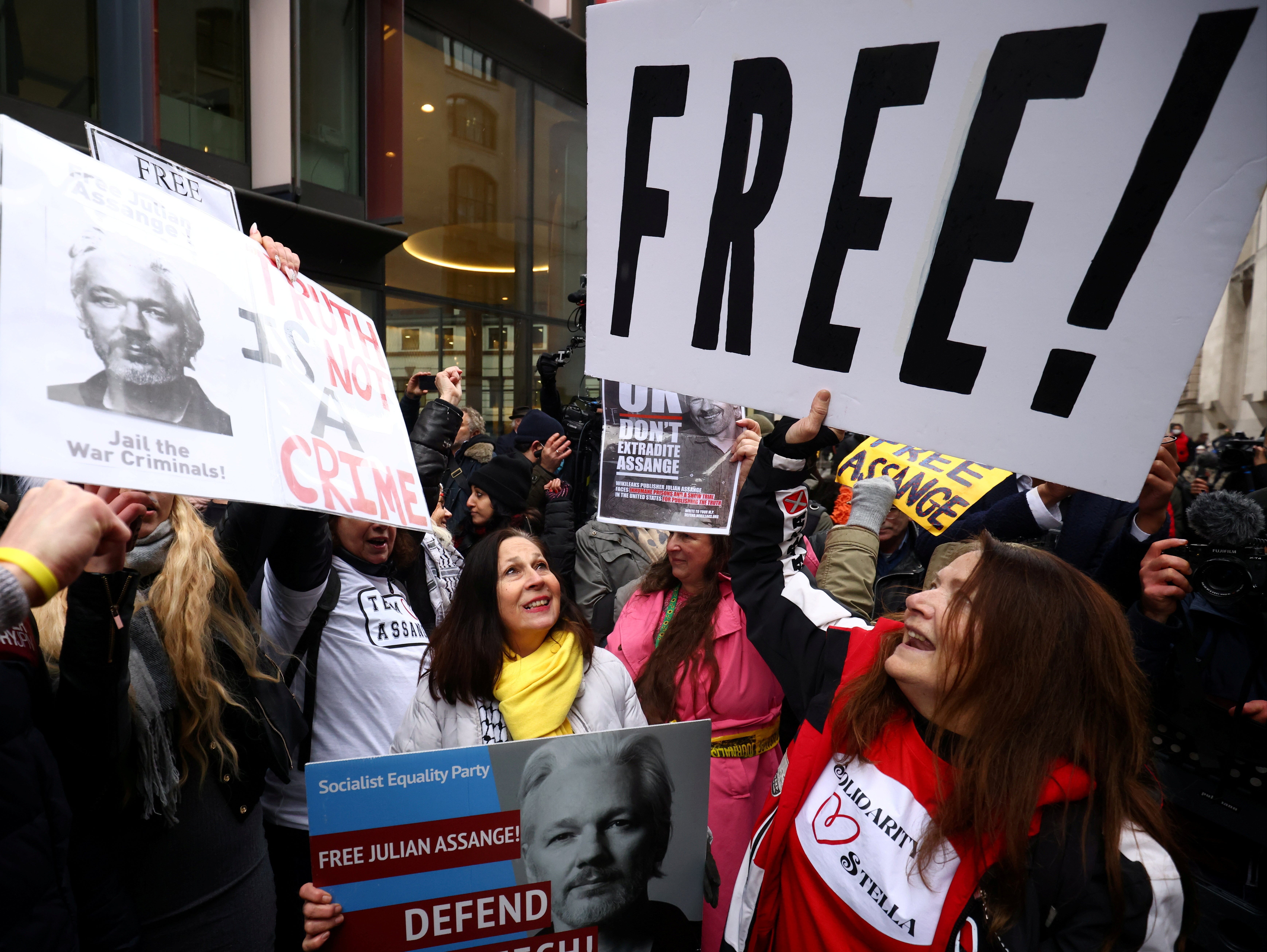Julian Assange subdued in court as judge’s ruling only ‘first step’ in battle against US extradition
As US authorities move to appeal against British judge’s ruling against extradition, WikiLeaks founder still faces a long legal struggle, writes Lizzie Dearden

Julian Assange spoke only once, quietly, during the court hearing that was due to decide his long-running battle against being extradited to the US.
Protesters shouted for their hero outside, as the global media assembled, and supporters – and detractors – around the world waited with bated breath for the result.
But in the eye of the storm, Assange sat silently in the centre of a strangely intimate Old Bailey court hearing.
Because of coronavirus restrictions, only just over a dozen people were present as District Judge Vanessa Baraitser delivered her ruling.
Assange, in a navy suit and a dark green face mask, arrived in the dock with a jumper thrown around his shoulders for warmth.
The WikiLeaks founder sat in silence for the duration of the hour-long hearing, being asked only to confirm his name and date of birth, as his fiancée looked on.
For the Assange camp, the hearing did not start well. For more than 40 minutes, District Judge Baraitser dismissed argument after argument made by the defence team.
She threw out claims that his extradition to the US would be unlawful under the terms of a treaty, would violate freedom of speech and other human rights, was politically motivated or would punish mere investigative journalism.
Suggestions that a US jury would be biased, or that Chelsea Manning’s evidence was a result of torture, and that Assange would not be protected by the US constitution were given short shrift.
District Judge Baraitser also rejected suggestions that the length of time since the leaks made the extradition unjust, and told the court that the impact on his partner and children was “nothing out of the ordinary”.
Assange’s extradition appeared to be a foregone conclusion as the judge said he had “sacrificed the safety of individuals” named in leaked documents and caused some to flee their home countries with their families.

But the hearing took an abrupt turn when the judge started to address the 49-year-old’s health, which had been a core concern raised not only by his legal team, but also by human-rights groups and United Nations experts.
Lengthy extradition proceedings heard how Assange could be held under “special administrative measures” before trial, and then at the ADX Florence prison in Colorado.
The court also heard that Assange had been under a care plan for prisoners at risk of suicide or self-harm since arriving at HMP Belmarsh in April 2019, and had told staff of plans to end his life.
Psychologists found that he suffers from a recurrent depressive disorder, which is sometimes accompanied by psychotic features, as well as autism spectrum disorder.
The district judge told the court that if sent to the US, Assange would be in “conditions of near-total isolation” and without the factors needed to mitigate his suicide risk.
As she explained that the conditions meant the extradition was legally “oppressive” and could not be allowed, Assange’s fiancée broke down in tears and hugged the editor-in-chief of WikiLeaks, Kristinn Hrafnsson.
Assange barely reacted and did not comment to the three journalists allowed in the court as he was led back down to the cells.
He will have known that the judge’s findings were not the end of his legal battle, and US authorities immediately announced their decision to appeal.
It was due to take another two days at least before a court would consider releasing Assange on bail, and the legal saga will continue long after that.
For his supporters, Assange remains a campaigner for truth and accountability, an investigative journalist, a hero for freedom of speech.
The disclosures by defence analyst Chelsea Manning in 2010 and 2011 exposed war crimes in Iraq and Afghanistan, including footage of American soldiers killing unarmed civilians from a helicopter.
But to his detractors, Assange remains a criminal, a hacker, a narcissist and a liar, despite District Judge Baraitser’s ruling.
Speaking outside the court, his fiancée Stella Moris, said the court had recognised the “seriousness and inhumanity” of what Assange faces in the US.
Ms Moris, who has two sons with Assange, appealed for Donald Trump to end the prosecution and “let our little boys have their father”.
She accused the US government of wanting to “punish Julian and make him disappear into the deepest, darkest hole of the US prison system for the rest of his life”.
Ms Moris said the ruling was the “first step towards justice in this case”, but sounded a note of warning for jubilant supporters.
“As long as Julian has to endure suffering in isolation as an unconvicted prisoner at Belmarsh prison, as long as our children continue to be robbed of their father's love and affection, we cannot celebrate,” she said. ”We will celebrate the day he comes home.”



Bookmark popover
Removed from bookmarks